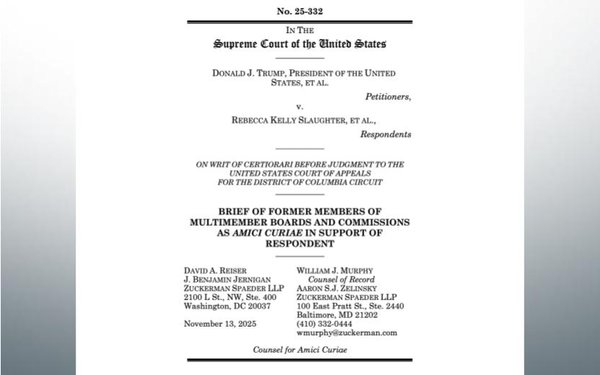
Ousted Federal
Trade Commissioner Rebecca Kelly Slaughter's bid for reinstatement is drawing support from more than 30 former agency officials, including ex-Federal Communications Commission chair Tom Wheeler,
former Securities and Exchange Commissioner Luis Aguilar and former Federal Election Commission chair Darryl Wold.
They are urging the Supreme Court to follow the precedent it
established 90 years ago, when it rejected Franklin D. Roosevelt's attempt to fire an FTC commissioner without cause. The court said in that case, called Humphrey's Executor, that a president could
only remove the commissioner for the three reasons set out by Congress -- inefficiency, neglect of duty, or malfeasance in office.
The ex officials (referred to as "amici")
argue in a friend-of-the-court brief filed Thursday
that they know from experience that agencies make better decisions when their members have different viewpoints.
advertisement
advertisement
"Amici’s experience confirms that multimember bodies
composed of members with varied perspectives generally reach better conclusions than those which lack such diversity, because views must be tested in the crucible of debate and discussion among the
members," they argue.
They add that allowing a president to fire agency members for any reason whatsoever "will create rapid and discontinuous changes in policy that Congress
did not intend when it created these agencies in the first place."
Their brief comes in a battle that began in March, when President Donald Trump ousted Slaughter and
Commissioner Alvaro Bedoya, both Democrats, from the five-member commission. At the time, Trump told them: "Your continued service on the FTC is inconsistent with my Administration’s
priorities."
Slaughter sued for reinstatement and the lower courts sided with her, basing their decisions on the 90-year-old Humphrey's Executor ruling.
Trump appealed to the Supreme Court, which halted the lower court orders on an emergency basis,
blocking Slaughter's return to the agency.
Last month, the administration officially asked the court to overrule Humphrey's Executor, arguing the Supreme Court "grievously
erred in holding that the President could not remove FTC Commissioners at will."
U.S. Solicitor General John Sauer argued in the administration's written brief that the 1935 decision was "poorly reasoned" and conflicts with Article II of the
Constitution, which sets out the president's powers.
"Removal is the President’s indispensable tool of control," Sauer argued. "When the President removes executive
officers, courts cannot reinstate them and authorize them to wield executive power against the President’s will."
Slaughter is asking the court to reject that position,
arguing that Congress has long had the power to create agencies and restrict the president's ability to fire members.
The former officials aren't the only ones to side with
Slaughter. Dozens of watchdogs including the Electronic Privacy Information Center, Consumer Federation of America and Truth in Advertising, Inc. also filed a friend-of-the-court brief in support of
her.
They say that when Congress created the FTC, lawmakers "made a crucial choice to shield commissioners from at-will removal by the president ... to ensure lasting
administrative expertise, stability, and deliberation and minimize influence from short-term political coercion and industry domination."
"Throughout U.S. history, independent
regulatory commissions with bipartisan membership and for-cause removal protections have safeguarded the public interest by grounding decisions in expertise and national needs rather than politics,"
the groups write.
"Across more than a century ... the Commission has advanced consumer protection and market
fairness -- whether by confronting deceptive tobacco advertising, policing abusive financial practices, or protecting children’s online privacy," the watchdogs argue. "In each case, the
FTC’s credibility and success depended on its insulation from political interference."
The Supreme Court will hear arguments in the case on December 8.